The first quarter of 2015 was very special and in this article you will find some of the highlights of the past three months.
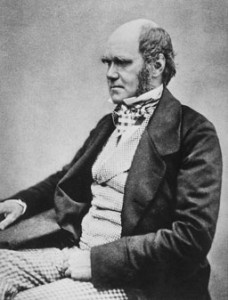

Workshop and Conferences for this summer
3 workshops are already scheduled, with more to come later this year.
More details about our Collection Management Workshops:
- APGA annual conference, Minneapolis, USA. 26th of June.
- EuroGard Congress, Paris, 7th July. (More details to follow).
- Johannes Gutenberg-Universität Mainz, Germany, 9th of October.
This summer, you will find us at the following conferences:
- APGA annual conference in Minneapolis, June 22-26.
- EuroGard Congress, Paris, July 6-10.
- 2015 APGA-Esri GIS Symposium, San Diego, July 20-22.
ArcGIS toolbox from Alliance for Public Gardens GIS
We are happy to announce the release date for the ArcGIS toolbox. Version 1.0 of the toolbox will allow ArcGIS users to load plant records directly from the plant record database into the ArcGIS Public Garden Data Model. In addition, there will be integrated hyperlink support which will enable users to click on Map Markers to open plant record system from ArcGIS. More details to follow nearer the release.
The toolbox will be available for free download from 14th of May.
Requirements:
- ArcGIS 10.x + ArcGIS Public Garden Data Model.
- Recent version of you plant record system with Mapping Capabilities.
More details about Alliance for Public Garden GIS: http://publicgardensgis.ucdavis.edu/
Symposium “Botanic Garden in the Changing World”
We would like to thank Dr Paul Kessler and the rest of his team at Hortus Botanicus Leiden for organising such a great symposium. The programme, atmosphere, location and speakers were as good as it gets.
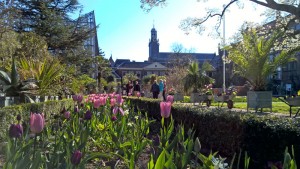
The opening keynote by Dr Paul Smith, secretary general of BGCI, was truly inspiring and captured the topic of the symposium very well. I also found the discussions on the topic of how to make your garden “future proof” very interesting. The presentation by Dr Maximillian Weigend, Director of the Botanic Garden of the University of Bonn, provided the delegates with a very useful introduction to what we may call the “Taxonomy of Collection Management (See my interpretative illustration). The backdrop of the symposium was the 425 year celebration of Hortus Botanicus Leiden, the oldest botanic garden in the Netherlands. From the oldest botanic garden in the world,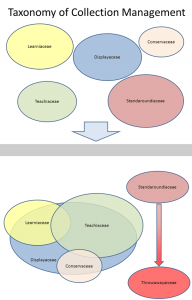 Orto botanico di Padova in Italy, Dr Giorgio Casadoro told an inspiring story about the past, the present and the future of this iconic garden. Carrying the idea of looking towards the future, the final presentation at the symposium was presented by Dr. Didik Widyatmoko from the Centre For Plant Conservation Bogor, Indonesia. Dr. Widyatmoko shared with us the fantastic story about a project of establishing at least one botanic garden in each of the 20 provinces in Indonesia. 27 gardens are already established or planned in this vast country that supports the world’s second highest level of biodiversity. To put the challenge in perspective, the Indonesian archipelago is spread over a mind boggling 17.000 islands. If you visit a new island every day, it will take roughly 46 years to visit them all.
Orto botanico di Padova in Italy, Dr Giorgio Casadoro told an inspiring story about the past, the present and the future of this iconic garden. Carrying the idea of looking towards the future, the final presentation at the symposium was presented by Dr. Didik Widyatmoko from the Centre For Plant Conservation Bogor, Indonesia. Dr. Widyatmoko shared with us the fantastic story about a project of establishing at least one botanic garden in each of the 20 provinces in Indonesia. 27 gardens are already established or planned in this vast country that supports the world’s second highest level of biodiversity. To put the challenge in perspective, the Indonesian archipelago is spread over a mind boggling 17.000 islands. If you visit a new island every day, it will take roughly 46 years to visit them all.
It was also especially nice to follow the presentation “Dutch botanic gardens are Planting the Future” by Joke ‘t Hart from the NVBT and Dick van Dijk from the Waag Society. In March this year, we formally joined the project with the responsibility to design and develop a “Collective Plant Collection Database Service for Dutch Botanic Gardens” (more below).
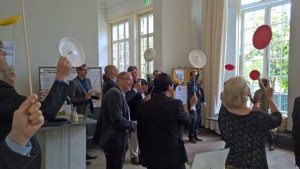
Collective Plant Collection Database Service for Dutch Botanic Gardens
In March, we were fortunate to have our proposal for a “Collective Plant Collection Database Service for Dutch Botanic Gardens” accepted by the “Planting for the future” project.
“Planting for the future” is a five year project, started in 2013 where the members of the Dutch Association of Botanic Gardens (NVBT) will work together on a new public outreach programme. In cooperation with the Waag Society and supported by the Dutch Postcode Lottery the gardens will link up their plant collections and share this information with the public in an innovative way in a project called “Planting for the future”.
Our role is to develop and deliver a database service named “Cordia”, which will be used as a repository of plant collection data. The service will receive data from different data sources, merge the information into one cohesive database and make this rich dataset available for application developers to create solutions that can connect people with botanic gardens. The project is scheduled for completion later this year.
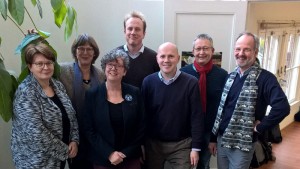
Mobile on Nautiz X8
Late last year, the Handheld Group released a new exciting device named “Nautiz X8”. We have had the opportunity to test this device and can warmly recommend this excellent machine. To select the right device for you:
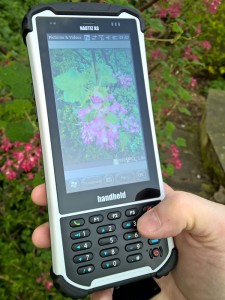
- Barcode scanning: Motorola MC55A0 (or similar).
- Sub meter GPS: Trimble 7X H-Star.
- Solid machine (IP67), big screen (4.7), very good performance (1.5 GZ): Nautiz X8.
The device is available for around £800 / $1300 and can also be upgraded to Android later on. This is a great option for those of you waiting for our Android version. More details about Nautiz X8 can be found under “Recommended devices” in the IrisBG Mobile Page.
We are happy to let you know that Handheld for Android is moving forward. Keep in mind that we will continue to support the current Windows Embedded Handheld (WEH) platform. The WEH platform will be the choice for users who are looking for high precision GPS equipment and/or need to be able to use a handheld device without any data connection.
The Android version will be for gardens who want to have a greater choice of devices and the possibility to use their own smartphones. However, the Android version will require a data connection (3G-4G, Wi-Fi), with some support for partially disconnected mode. More details to follow later.
